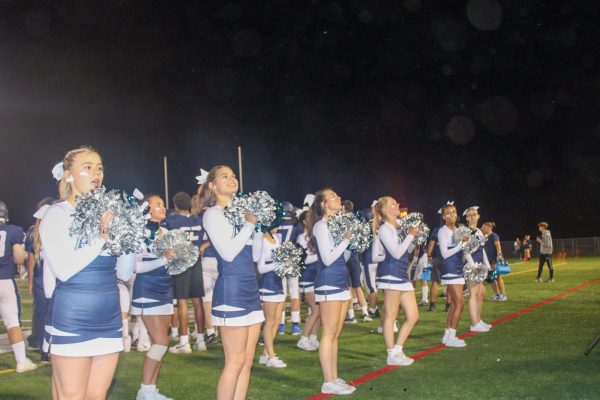Moby Dick: A Classic of Western Society

A Cover Art of Herman Melville’s “Moby Dick” featuring the white whale lunging out of the sea. Labeled for Reuse by Creative Commons.
Imagine being aboard the infamous Pequod vessel in early 1850, pursuing the magnificent white whale under the orders of Captain Ahab and experiencing the journey of a lifetime.
Herman Melville’s popular novel has earned a rightful place among the elite in Western civilization and culture. But why is that so? Why is it that not many people have had the chance to read Moby Dick despite its large popularity?
“Although he puts it through the pen of his narrator, Melville is writing personally, honestly, and humorously (“not excluding its suburbs”!) about his novel’s conceit as well as its Leviathan antihero,” blogger and published author Ed Sikov informed in his article “Why ‘Moby-Dick’ Matters”.
Melville’s choice of diction is genuinely intriguing. I’ve heard my entire life from my father and other relatives and friends that Melville’s long descriptions were a painful experience and made Moby Dick all the harder to get through. Because of that, I’d put it off most of my life. However, upon reading Melville’s extremely long descriptions behind the entrance to a tavern, I instantaneously became fascinated by his style of writing.
“The long descriptions were fascinating for no other reason than they heightened the plot of the book. The story itself takes up very little of the book, but the long descriptions, particularly those which go into the catching and gutting of a whale, add to the book overall. First, this is a great primary source when it comes to looking at history through literature. Moreover, it shows Ahab’s insane obsession with catching the whale,” English teacher Rachelle Keith stated.
“Typically, the long, drawn-out descriptions are meant to create verisimilitude, not to drive readers crazy (which is my alternate theory),” elaborated English teacher Dallas Hall.
It is doubtful that these ten-page descriptions of a single object could potentially drive students and even the most determined avid readers insane. But that is clearly not its purpose. Melville’s long descriptions, as Keith put it, “heightened the plot of the book.”
“Let’s face it: most of us write about fleas. We tend to create stories about little people living little lives. Dysfunctional families. Drug addicts. Broken souls. Criminals. Ourselves. Memoirs and noir novels and stories, to cite two genres popular with LitReactor writers and readers, don’t really try to tackle very much of the big, wide world: they’re about mood, not mankind—individual experience rather than all of humanity,” Sikov added.
So, why is it that Melville spent hours detailing and describing throughout his entire novel- which doesn’t revolve much around the hunt for the white whale?
“This book does a great job detailing how corrupt mankind can become. Melville changes the audience’s perceptions of good and evil. At first, we think the whale is evil and should be hunted for its killing nature. In the end, the lines of good and evil are blurred until we see that the humans are ultimately evil ones as their vanity and pride end in corruption,” Keith explained.
Furthermore, Keith expressed why novels like this play important roles in present-day society.
“The beautiful thing about literature is that, at the end of the day, it’s an art form. Art reflects life and life reflects art. Melville’s Moby-Dick centers on a very realistic problem for all of humanity. We should heed its warning. And Melville is not the only one who does this. Strong pieces of literature, whether fictional or not, reflect the realistic problems in humans. Because of this, literature is certainly [a] guide to our everyday lives,” Keith finished her thoughts.
“Even though I haven’t read it, I do feel that it is important to Western culture since it is widely considered to be part of the Western literary canon. This is evident through countless cultural references to the work, even in satirical TV like Family Guy,” Hall discussed.
“I do believe that books can be a guide for us, even if they are fiction,” English teacher Emily Doryk stated. “Books are written by people with a variety of different experiences, who put themselves and their worldview into their writing. Because of this, even if the characters/worlds are fake, the feelings and situations are not.”
“I have a strong belief that we can learn so much from literature, whether or not it is fiction. Books give us insight and lessons that we can use in the real world because stories are inherently based on someone’s personal experiences, even if the novel is high fantasy with dragons flying around,” Pearl Sonnenschein, another English teacher from Air Academy, added. “It’s the core of the characters’ conflicts that we can all learn from.”
“While I remember that many of my classmates didn’t enjoy the text, I am not exaggerating when I say that reading Moby Dick was a turning point in my relationship with literature,” Eagleview English teacher Elizabeth Busler remarked.
Although Busler read an abridged version of the text, she happens to have an opinion on Melville’s dramatically long descriptions.
“Though I missed that experience as a teen, I would liken it to how my 7th-grade students used to feel about reading all of Jules Verne’s descriptions in Twenty-Thousand Leagues Under the Sea. They felt that the description dragged on and on, and I always had to remind them that Verne’s contemporary readers couldn’t just bop up to the Denver Aquarium or turn on a ‘Planet Earth’ documentary to see what all those species of fish looked like, though readers today can,” Busler began.
Jules Gabriel Verne was another of Western Society’s renowned writers known for his works such as Twenty-Thousand Leagues Under the Sea, A Journey to the Center of the Earth, and Around the World in Eighty Days. Like Melville, Verne tended to create an ample supply of imagery and long descriptions throughout his novels which often bore readers.
In the end, like many other popular novels such as Steinbeck’s emotional rollercoaster Of Mice and Men or F. Scott Fitzgerald’s The Great Gatsby or Nathaniel Hawthorne’s The Scarlet Letter, Herman Melville’s Moby-Dick stands among the elite proudly.
Perhaps it is not my favorite novel in literature, but evidently, so, Melville’s wild detail of imagery elicits the clear image behind human corruption and common nature.
“…for there is no folly of the beasts of the earth which is not infinitely outdone by the madness of men,” Melville quotes in his novel comparing the white whale to the common nature of mankind.
Certainly, Melville’s epic tale is worth the distance and the swim, despite how tiresome or long it may seem.

How’s it hanging guys? My name is Angel B. Jimenez and it's my first year here at the Jetstream Journal. I’m super excited to explore the corridors...













Mrs. Cullen • Mar 15, 2021 at 5:22 pm
I am ashamed to admit that I have not yet read Moby Dick, but it has been on my “to-read” list for a very long time. It can be daunting to take on such a lengthy classic (even for an English teacher who LOVES reading). Thank you for writing this article! I feel more inspired than ever to read Melville’s classic.